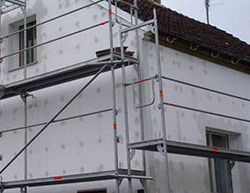
Alliance: New buildings must be more energy-efficient by only 10 to 20 percent
 |
"New buildings will not have to have zero consumption by any means. This designation of houses is misleading and does not correspond to its name in reality. It is a technical term that was borrowed from the European directive on the energy performance of buildings from 2010. In reality, new buildings will be only 10 to 20 percent more economical compared to currently constructed residential buildings," Holub stated.
According to him, the specific value of the requirement depends on the shape, orientation, glazing ratio, and other parameters of the building. The need for heating energy is newly defined in the range of 30 to 70 kilowatt-hours per square meter per year, which is about a fifth less compared to current requirements (40 - 90 kWh/m2). "The passive energy standard, as currently defined in the New Green Savings, has this requirement down to just 15 kilowatt-hours per square meter per year," Holub added.
A similar reduction in energy consumption as for heat demand is also necessary for the consumption of non-renewable primary energy, which is the energy needed for the operation of the building excluding user appliances, originating from non-renewable sources such as coal, natural gas, or electricity.
"Additionally, new buildings will not have to be equipped with a controlled ventilation system. However, to meet the hygiene standards for ventilation, tightly sealed buildings, which applies to today's construction, can have controlled ventilation with heat recovery installed," Holub stated.
He emphasized that this does not represent a fundamental tightening of requirements, and therefore the financial extra costs will not be significant either. "According to statements from quality builders, construction according to the new standard does not have to be financially more costly if the residential building is well-designed from the beginning," Holub further stated.
The Association of Developers expects that the increased costs will ultimately be manageable for investors and clients. "After a slight initial agony regarding the tightening of energy parameters for buildings, I must admit that the changes will not be as burdensome for developers as it initially seemed. The benefit for end clients will mainly be energy savings and higher construction quality. Of course, a somewhat higher cost is associated with that," said Tomáš Kadeřábek, director of the association, to ČTK.
The Alliance for Buildings compared energy performance certificates of six larger residential projects currently offered by Prague developers Central Group, Skanska Reality, JRD, YIT, and Trigema. "From this offer, more than half meet the new standard, and nearly 30 percent of the apartments are close to meeting it. Specifically, it would suffice if developers increased the thickness of insulation by a few centimeters or replaced double-glazed windows with triple-glazed ones," Holub noted.
According to the EU directive, newly constructed houses must meet stricter energy requirements starting in 2021. Czech legislation has adapted to this requirement based on estimated construction timelines. Starting this year, building permits with new requirements are being issued for buildings over 1500 square meters, starting in 2019 for those over 350 square meters, and from 2020 for smaller houses. "The new law was adopted by the Czech Republic in 2012, so the construction market has known the new conditions for more than five years. It is also necessary to add that the gradual tightening of requirements for energy efficiency has been apparent in our country in several-year intervals since the 1980s," Holub concluded.
The English translation is powered by AI tool. Switch to Czech to view the original text source.









